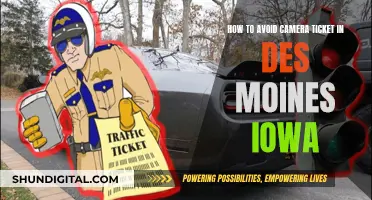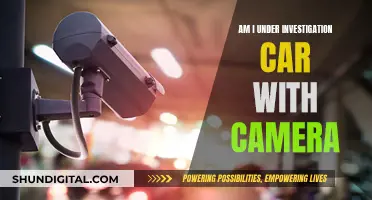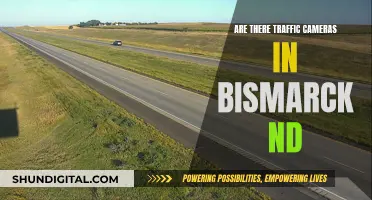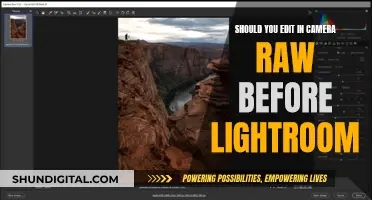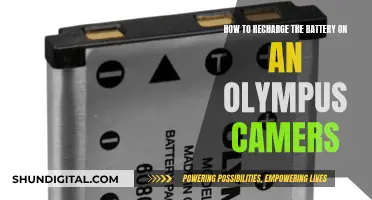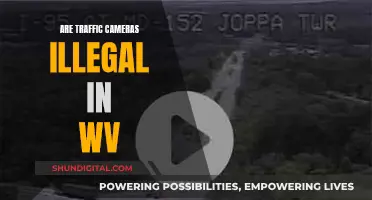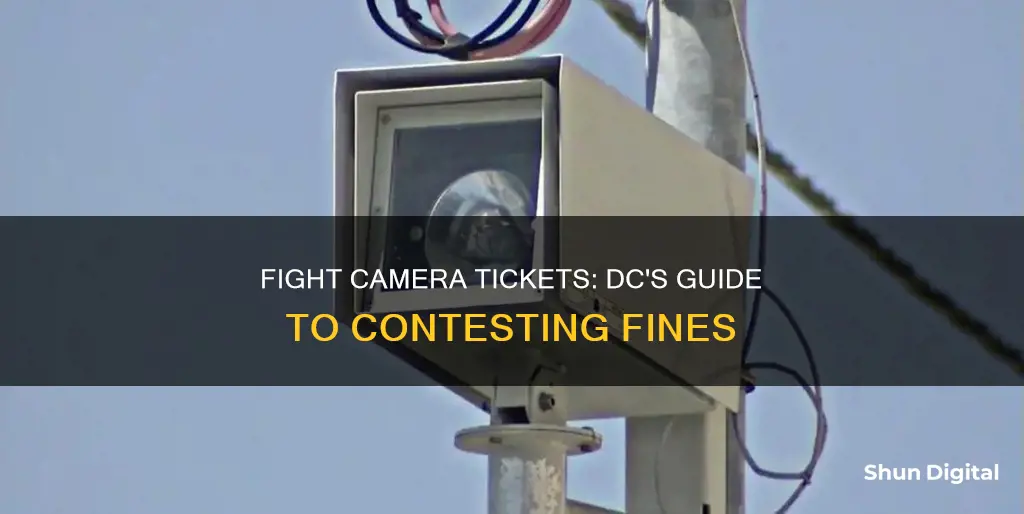
If you want to fight a camera ticket in DC, the worst thing you can do is pay the fine. Paying the fine admits guilt and ends the adjudication process. Instead, you have three options: admit guilt and pay the fine, “admit with explanation,” or deny the citation. If you choose to deny the citation, you have 60 days to file your challenge. You can do this online or by appearing at a walk-in hearing. If you miss the 60-day window, you can file a Motion to Vacate Judgment within 120 days of the citation.
| Characteristics | Values |
|---|---|
| Time to challenge ticket | 60 days |
| Ways to challenge ticket | Online, by mail, or in-person |
| Supporting documentation | Vehicle registration, photo of vehicle, detailed ParkMobile 'sessions' receipt, paper receipt from meter |
| Hearing examiner's decision | Fine and/or penalty, reduced fine and/or penalty, dismissed ticket |
| Missed hearing | File a "Motion to Vacate Judgment" within 120 days of citation |
| Appeal process backlog | 20 months |
| Appeal fee | $10 |
What You'll Learn

Submit proper evidence
If you want to fight a camera ticket in DC, it's important to understand the process and submit the proper evidence to support your case. Here are some detailed instructions on how to submit effective evidence when contesting a camera ticket:
Understanding the Process:
Before submitting evidence, it's crucial to understand the process of contesting a camera ticket in DC. The first step is to decide on the method of contesting, which can be done online, by mail, or in-person. Keep in mind that you must submit your contest within 30 calendar days of receiving the ticket to avoid additional penalties.
Gathering Evidence:
When gathering evidence to fight a camera ticket, there are several types of evidence that can be helpful:
- Photos and Videos: Visual evidence can be powerful in supporting your claim. For example, you may have photos or videos that show the circumstances of your parking or moving violation, such as a clear sign that you were parked legally or that a traffic signal was malfunctioning.
- Witness Statements: If there were witnesses to the incident, their statements can provide valuable corroboration of your version of events. Make sure to include contact information for witnesses so that the hearing examiner can follow up if needed.
- Maintenance Records: In some cases, maintenance records for your vehicle may be relevant. For instance, if you were ticketed for speeding but can show that your vehicle has a documented history of mechanical issues that affect its speed, that could be persuasive evidence.
- Documentation of Similar Cases: Researching and presenting cases where similar tickets were dismissed can provide a precedent for your defence. Look for cases with similar circumstances and note the evidence and arguments presented.
- Proof of Non-Receipt: If, like the person in the example above, you never received the initial citation and only received a penalty for non-payment, this could be a key part of your defence. Gather any evidence you can that supports your claim of non-receipt, such as testimony from others who may have handled your mail or evidence of postal service issues in your area.
Presenting Your Evidence Effectively:
When submitting your evidence, it's important to present it clearly and concisely. Organise your evidence in a logical manner and consider providing a summary or explanation for each piece of evidence. Remember that the hearing examiner will be reviewing your submission to make a decision, so make sure your defence and the relevance of each piece of evidence are clear.
Additionally, be mindful of any legal defences that may apply to your specific type of ticket. For example, there may be specific defences for parking tickets, such as a malfunctioning parking meter, that you can include in your defence.
In conclusion, when fighting a camera ticket in DC, taking the time to gather and submit proper evidence can significantly improve your chances of a favourable outcome. Remember to provide clear and persuasive evidence that supports your defence, and don't be afraid to seek additional resources or advice if needed.
New Orleans Camera Tickets: What You Need to Pay
You may want to see also

Don't pay the fine upfront
If you want to contest a ticket, do not pay the fine upfront. Once a ticket is paid, you are no longer able to contest it or request a refund.
You can contest a ticket virtually, online, by mail, or in-person. To do so, submit your statement, defence, and any evidence for the defence that you want the hearing examiner to consider. A DC DMV hearing examiner will read the information you submit and decide whether you must pay the fine and any penalty, or if the ticket should be reduced or dismissed based on DC Code and traffic regulations. The hearing examiner will mail the decision to the vehicle owner’s address of record with the DMV.
If you decide to contest a ticket by mail, DC DMV will send you a postcard to indicate they have received your request. To avoid additional penalties, DC DMV must receive your request within 30 calendar days. If you don’t receive this postcard, you may contact DC DMV or call DC 311 to confirm receipt of your adjudication request. Mail your statement or the adjudication form to:
> DMV Adjudication Services
>
> ATTN: Mail Adjudication
>
> PO Box 37135
>
> Washington, DC 20013
To contest a parking or photo ticket in-person, you must visit the Adjudication Service Center for a walk-in hearing. You must be the registered owner of the vehicle and present the vehicle registration, or the owner must authorize someone to act on their behalf by completing and signing the power of attorney form. If you are contesting a ticket issued to a rental car, you must provide the rental agreement for the vehicle, showing the rental period matching the date of issuance for the ticket.
Hubble's Camera: Unmatched Resolution in Space Exploration
You may want to see also

Question the accuracy of the camera
If you want to contest a ticket, do not pay the fine. You cannot contest a ticket once you have paid the fine or request a refund.
You can contest tickets virtually, online, by mail, or in person. To contest a ticket in person, you must be the registered owner of the vehicle and present the vehicle registration, or the owner must authorize someone to act on their behalf by completing and signing a power of attorney form. If you are contesting a ticket issued to a rental car, you must provide the rental agreement for the vehicle, showing the rental period matching the date of issuance for the ticket.
When contesting a camera ticket, you can question the accuracy of the camera. You can request maintenance and calibration records for the camera, and provide evidence that your speedometer is accurate. If your speedometer is accurate and the camera is off by more than 2%, then you may have a case for reducing the ticket.
However, it is important to note that the technology for speed cameras has been well-tested and is unlikely to be faulty. Additionally, camera tickets are not considered moving violations and do not result in points on your license or affect your insurance rates. As such, it may not be worth the time and effort to fight a camera ticket based on the accuracy of the camera.
Charging Your Spy Gear Camera: How Long is Enough?
You may want to see also

Request a hearing
If you want to contest a ticket, do not pay the fine and/or penalty. You cannot contest a ticket once you have paid the fine and/or penalty, nor can you request a refund.
You can request a hearing to contest a ticket by mail or in-person. To contest a ticket by mail, send your statement or the adjudication form to:
> DMV Adjudication Services
>
> ATTN: Mail Adjudication
>
> PO Box 37135
>
> Washington, DC 20013
To avoid additional penalties, your request must be received within 30 calendar days. If you don't receive a postcard confirming receipt of your request within this timeframe, contact the DC DMV or call 311 to confirm.
To contest a ticket in-person, you must visit the Adjudication Service Center for a walk-in hearing. You must be the registered owner of the vehicle and present the vehicle registration, or the owner must authorize someone to act on their behalf by completing and signing a power of attorney form. If you are contesting a ticket issued to a rental car, you must provide the rental agreement for the vehicle, showing the rental period matching the date the ticket was issued.
If you are contesting a camera ticket, note that these are the least likely to be overturned. According to an analysis by AAA Mid-Atlantic, only 6% of people who received tickets in the mail from a camera challenged them, and 80% of those drivers were still ordered to pay the fine.
Understanding Camera Drive Modes: Unleashing Your Photography Skills
You may want to see also

File an appeal
If you want to contest a ticket, do not pay the fine. You cannot contest a ticket once you have paid the fine, nor can you request a refund.
If you decide to challenge the ticket, there are some things you need to know. The most important thing to remember is to submit proper supporting documentation at the beginning of the process. You must submit evidence supporting your defence when you make your initial challenge.
If your initial challenge is denied, you can enter the second phase of DC DMV ticket adjudication by filing an appeal. At this point, pay the ticket and the required $10 appeal fee. The appeal process currently has about a 20-month backlog.
To contest a parking or photo ticket in person, you must visit the Adjudication Service Center for a walk-in hearing. To contest a ticket, you must be the registered owner of the vehicle and present the vehicle registration, or the owner must authorize someone to act on their behalf by completing and signing a power of attorney form.
How Long Do Camera Battery Chargers Last?
You may want to see also
Frequently asked questions
You have three options: admit guilt and pay the fine, “admit with explanation,” or deny the citation.
If you pay the fine within 30 days, you can avoid a penalty equal to the fine being added. If you want to challenge the ticket, you have 60 days to file your challenge.
If you miss the 60-day window, you can file a "Motion to Vacate Judgment" within 120 days of the citation to determine if your challenge can move forward.
You can file an adjudication request for each of the tickets. This has worked for some people in the past.
You can question the accuracy of the camera, including its age, useful life, certificates, and maintenance records. You can also argue that there was more than one car in the picture and cast reasonable doubt on which car was speeding.


